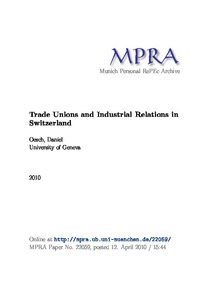Trade unions and industrial relations in Switzerland
"Switzerland's system of industrial relations was for a long time synonymous for stability. Once the system of collective bargaining had been put into place at the beginning of the 1950s, Swiss trade unions settled into their role as subordinate partners in decentralized and consensual ind...
| Main Author: | |
|---|---|
| Institution: | ETUI-European Trade Union Institute |
| Format: | TEXT |
| Language: | English |
| Published: |
Munich
2010
MPRA |
| Subjects: | |
| Online Access: | https://www.labourline.org/KENTIKA-19185982124919031649-Trade-unions-and-industrial-re.htm |
| Summary: | "Switzerland's system of industrial relations was for a long time synonymous for stability. Once the system of collective bargaining had been put into place at the beginning of the 1950s, Swiss trade unions settled into their role as subordinate partners in decentralized and consensual industrial relations. Stability came to an abrupt end in the 1990s, a decade that confronted trade unions with three major challenges. The first and foremost challenge arose from the unusually long recession of the early 1990s, which dealt a severe blow to membership in the traditional union strongholds. A second challenge was raised by the neoliberal turn in business organizations, which caught trade unions on the wrong foot. Thirdly, trade unions were challenged, at the end of the 1990s, by the imminent opening up of Switzerland’s labour market to the European Union. The liberalization of labour migration was threatening to undermine unions’ influence on wage-setting. These challenges – notably declining membership and the questioning of collective bargaining – put unions under pressure to initiate revitalization efforts. They took place on three different fronts. First, Swiss unions responded to the harsher economic context by investing more resources into political action, using direct democratic instruments to block neoliberal reforms. In parallel, they began to adopt new means of recruitment, targeting hitherto almost union-free private services, and resorted more frequently to strikes. Finally, the European wave of union mergers also seized the Swiss labour movement. Starting in the mid-1990s and gaining pace after 2000, a series of union mergers led to a profound restructuring of organized labour in Switzerland." |
|---|---|
| Physical Description: | 22 p. Digital |

